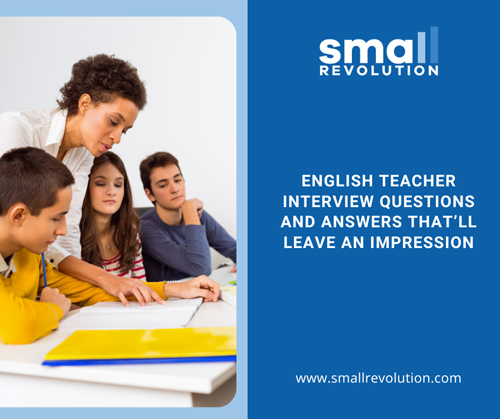Teaching is a rewarding job that allows you to make a positive impact on learners that will last for years.
To increase your chances of landing that English teacher position, you need to be adequately prepared. Apart from your teaching skills, interviewers want to know how you handle the non-technical side of the job.
So today, we look at:
- The most common questions you’ll likely encounter during an interview
- Sample answers to these questions
- Expert tips on giving appropriate responses
Preparing in advance will go a long way in ensuring you face the interview panel with boldness and leave a positive impression.
Question 1: What Motivated You to Become a Teacher?

It’s important that you avoid cliche answers such as “Teaching is fun.”
Your response needs to be personal—give genuine, heartfelt, and thoughtful examples from your life.
Example answers:
- “In elementary school, I struggled a lot with English because the concepts always seemed too complex to grasp. This affected my confidence greatly. Ms. Wood, my English teacher, noticed this and took the time to give me extra lessons. Her patience and kindness helped me improve my grades. I resolved to be that understanding teacher in the future.”
- “It’s my pleasure to share the knowledge of the English language that I’ve gathered over the years with students. I enjoy sharing information and I’ve found that young people are more enthusiastic about learning something new.”
Expert tip: Avoid talking about your negative experiences.
Question 2: Please Walk Me Through a Typical Lesson
Interviewers use this question to get a sense of your thought process on how you plan your lessons.
Tips for answering this question:
- Give the interviewer a quick walk-through of your lesson plan and explain why you took that approach.
- Highlight any parts of the lesson you would like to change based on past experiences.
Question 3: How Do You Motivate Students?

Interviewers use this question to see how you keep students engaged in the learning process
Motivating learners isn’t only about the class in general, but also covers individual students.
Example answers:
- “I’m a firm believer in positive reinforcement in keeping students motivated. Therefore, I use rewards like stickers, candy, or chocolates when they perform well. I try to give each student what they enjoy receiving so that none of them feels left out.”
- “During the lesson, I focus more on the students’ strengths and give them compliments on the same. In case a student is struggling with a concept, I encourage them to try again. If they still find it difficult then I go over the material with them to help them understand it better.”
Question 4: What Are You Bringing to Our School That Makes You Unique?

This is your chance to discuss some activities you’ve participated in that you can easily turn into teachable moments. If you can offer classroom activities that are outside the curriculum that the school is currently enacting, mention those as well.
Example answers:
- “I love encouraging students to interact with the English language in ways other than what’s set in the curriculum. In my previous role, I started a weekly games session where we played Scrabble, karaoke games, and Pictionary. The students loved it, and some still reach out to me years later thanking me for the experiences.”
- “Apart from the regular teacher training, I’ve also taken online editor jobs that have boosted my proficiency in English.”
Expert tip: Avoid vague answers such as “I have the required skills for an English teacher.” Demonstrate with relevant examples that you’re capable enough for the job.

Question 5: How Would You Handle a Student You Found Difficult to Teach?
Students have different personalities and learning abilities, which can make it challenging for a teacher to handle them all simultaneously. Your answer helps the interviewers determine if you’re capable of helping students with the varied obstacles they may face in the classroom.
Tips for answering this question:
- Show how you will figure out the cause of a student’s difficult behavior. Your strategy should be around meeting the student where they’re at, boosting their strengths, and discussing solutions with them instead of putting them down.
- If applicable, give a real-life story of how you worked with a difficult student in the past and how you succeeded.
The table below gives some excellent examples for answering this question, in contrast with what to avoid.
| Great | Terrible |
| I discuss the issue with the student privately | I point out their behavior in front of the class |
| I ask a student who’s acting out to calm down and offer a reward if they do | I make them sit alone in a corner |
| I offer extra coaching to slow students | I let them figure it out by themselves |
Question 6: Do You Have Any Questions for Us?
Prepare thoughtful questions focused on the specific interviewer and role to demonstrate your enthusiasm for working with the school.
Example questions:
- Would you like me to clarify anything about my experience or skills?
- What’s the most enjoyable part of your job?
- What qualities make a teacher successful in this role?
- Please tell me a little about the culture here at the school.
- What do you wish you had known about this school before you started working here?
- How do you receive and give feedback?
- Can you tell me a little about the culture at this school?
If this is the first interview, avoid self-serving questions that focus on benefits and time off. These questions make it seem like you’re more interested in what you’ll get rather than what you can offer.
Ask open-ended questions that encourage conversations. Yes-or-no questions don’t allow the interviewer to give more detailed answers.
Avoid asking questions about the job that can easily be answered by looking at the school’s website.
Face Your Next Interview With Confidence
Confidence plays a significant role in helping you give your best during interviews.
If you start getting nervous while answering the questions, slow down and think about why you became a teacher. Focusing on your passion for teaching will help you get through the session with ease.
For more resources on preparing for interviews, check out our comprehensive post on mistakes to avoid.
We wish you the best in your next interview.
Share on Facebook:


